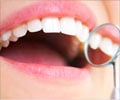Too much intake of diet soda can have a negative effect on your teeth, shows study.

In his study, Bassiouny found that a woman in her 30s who drank 2 liters of diet soda daily for three to five years experienced tooth rot and decay remarkably similar to that suffered by a 29-year-old methamphetamine addict and a 51-year-old habitual crack cocaine user, according to US News and World Report.
Methamphetamine and crack are known to ravage the mouths of users, and the two drug abusers needed all of their teeth extracted.
Besides exposing teeth to damaging acid, these illegal drugs reduce the amount of saliva in the mouth, providing less opportunity for the acids to wash away. The drugs also cause systemic health problems that affect dental hygiene. Previous studies have linked "meth mouth" with rampant decay.
Bassiouny said that the acid in soda is in the form of citric acid and phosphoric acid.
Without good dental hygiene, constant exposure could cause erosion and significant oral damage, he said.
Source-ANI
 MEDINDIA
MEDINDIA




 Email
Email










